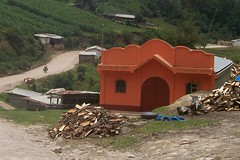Evangelicals and Catholicism in Guatemala
By rfay - Posted on August 29th, 2007
Tagged: Inuvik to Ushuaia
The Catholic churches in Mexico just wore us out. Every little town had an incredibly glorious cathedral that just amazed. The Spanish did a mighty fine job converting the folks in most of Mexico. However, as we got into southern Oaxaca and Chiapas, we started noticing that the Catholic churches were smaller and less ornate (and less tended) and we started seeing more little Evangelical churches.
Now in Guatemala this trend is accelerated, and you'd think the whole country was Evangelical Christian. There are Catholic churches in the main towns, but there are little Evangelical outfits everywhere, on every little road in the country. The official statistics say the country is about 50% Catholic now, 25% Evangelical, and 25% Mayan spirituality, but the influence of the Evangelicals is way out of proportion. Even the Catholics sometimes talk like Evangelicals, valuing Christian music. Every bus has a religious slogan on it, usually something from the Protestant side of the fence, not just an ordinary "Blessed Virgin" type of Catholic thing. Stuff like "Don't tell God how big your problem is, tell your problem how big God is." I think this is the most genuinely and openly religious country I've ever been in.
And the music is everywhere. We hear the good old hymns and the some of the sillier modern Christian songs EVERYWHERE. Sometimes the driving rhythm and the loudspeakers and the kind of poor communal singing can be a little pervasive. Nancy wonders if there's a patent on this kind of singing. Why does it sound kind of the same all over the world? And the preachers sound JUST LIKE the ones in our churches at home, with the same intonation and the same message, just a different language.
There are political implications of all this, too. The military leader and de-facto president during the 1980's civil war and genocidal destruction of the Mayan people and villages was Rios Montt, a flaming evangelical. And after the destruction of many of the villages and the deaths of many of the parents of people we're visiting, in some cases it was the evangelicals who returned from exile, with the catholics and mayan-religionists remaining in exile. And Rios Montt is still a major factor in Guatemalan politics, even though he has standing international charges of genocide against him. He's currently running for president of the congress.
The evangelical influence on the men is probably good. The evangelical men don't drink, which is good, because the drunken men are quite distressing. And the economic influence on families has to be upward, as evangelical movements have almost always been. All in all, it's a pretty interesting thing to watch.
Now in Guatemala this trend is accelerated, and you'd think the whole country was Evangelical Christian. There are Catholic churches in the main towns, but there are little Evangelical outfits everywhere, on every little road in the country. The official statistics say the country is about 50% Catholic now, 25% Evangelical, and 25% Mayan spirituality, but the influence of the Evangelicals is way out of proportion. Even the Catholics sometimes talk like Evangelicals, valuing Christian music. Every bus has a religious slogan on it, usually something from the Protestant side of the fence, not just an ordinary "Blessed Virgin" type of Catholic thing. Stuff like "Don't tell God how big your problem is, tell your problem how big God is." I think this is the most genuinely and openly religious country I've ever been in.
And the music is everywhere. We hear the good old hymns and the some of the sillier modern Christian songs EVERYWHERE. Sometimes the driving rhythm and the loudspeakers and the kind of poor communal singing can be a little pervasive. Nancy wonders if there's a patent on this kind of singing. Why does it sound kind of the same all over the world? And the preachers sound JUST LIKE the ones in our churches at home, with the same intonation and the same message, just a different language.
There are political implications of all this, too. The military leader and de-facto president during the 1980's civil war and genocidal destruction of the Mayan people and villages was Rios Montt, a flaming evangelical. And after the destruction of many of the villages and the deaths of many of the parents of people we're visiting, in some cases it was the evangelicals who returned from exile, with the catholics and mayan-religionists remaining in exile. And Rios Montt is still a major factor in Guatemalan politics, even though he has standing international charges of genocide against him. He's currently running for president of the congress.
The evangelical influence on the men is probably good. The evangelical men don't drink, which is good, because the drunken men are quite distressing. And the economic influence on families has to be upward, as evangelical movements have almost always been. All in all, it's a pretty interesting thing to watch.

